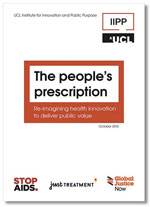About
Supported by the Open Society Foundations, the UCL Institute for Innovation and Public Purpose (IIPP)'s work on health innovation examines the notions of common good and public value in the biopharmaceutical sector through an alternative, mission-oriented approach that would transform the status quo.
While health innovation has received an enormous amount of global public and philanthropic funding, the existing biopharmaceutical innovation system, which is characterised by entrenched short-termism and striking misalignment with public interest, has at least four major problems. Firstly, companies prioritise R&D that is likely to deliver “blockbuster drugs” at the expense of commercially unappealing medicines that are hugely important to public health. Secondly, patents are often abused, being too upstream, wide, and strong, leading to high prices and lack of knowledge sharing and collaboration. Thirdly, the pricing of these medicines does not take into account the contribution by other actors, including public institutions. Fourthly, high prices are driven by – and in turn fuel – the financialisation of parts of the industry, where share buybacks are outpacing R&D.
Outputs

- The direction of innovation towards public health;
- The governance of innovation, such as the intellectual property rights, for collective intelligence;
- The accessibility of the innovation (e.g. the underlying pricing mechanisms) to enable diffusion;
- The financing of the innovation system aligned with sustainable, long-term goals.
A key focus across these areas concerns how public-private relationships in the innovation ecosystem can be better governed in the public interest, and to reflect the critical role of the public sector.
Policy implications
IIPP’s work in health has been translated into global policy impact. In the times of COVID-19, the problems with the current health innovation system have become much more poignant and exposed; at the same time, the pivotal role of the public sector is much accentuated, with the magnitude of public investment having multiplied and gone global. In response, IIPP has set up a COVID-19 Taskforce to apply its thinking in addressing the economic and health challenges brought by the crisis.
Learn more about IIPP health innovation policy impact
Projects
Further reading
- Academic working papers
- Albala, S., Holloway, C., Austin, V. and Kattel, R. (2021). New economics of assistive technology: A call for a missions approach. UCL Institute for Innovation and Public Purpose, Working Paper Series (IIPP WP 2021/04). Available at: https://www.ucl.ac.uk/bartlett/public-purpose/wp2021-04
- Mazzucato, M and Li, H.L. (2020). A market-shaping approach for the biopharmaceutical industry: governing innovation towards the public interest. UCL Institute for Innovation and Public Purpose, Working Paper Series (IIPP WP 2020-21). Available at: https://www.ucl.ac.uk/bartlett/public-purpose/wp2020-21
- Mazzucato, M and Li, H. L. (2020). The Entrepreneurial State and public options: Socialising risks and rewards. UCL Institute for Innovation and Public Purpose, Working Paper Series (IIPP WP 2020-20). Available at: https://www.ucl.ac.uk/bartlett/public-purpose/wp2020-20
- Mazzucato, M, Roy, V. (2017). Rethinking Value in Health Innovation: from mystifications towards prescriptions. UCL Institute for Innovation and Public Purpose, Working Paper Series (IIPP WP 2017-04). Available at: https://www.ucl.ac.uk/bartlett/public-purpose/publications/2017/nov/reth...
- Journal articles, editorials and book chapters
- Mazzucato, M., & Li, H. L. (2021). The Entrepreneurial State and Public Options. In Politics, Policy, and Public Options (pp. 20–44). Cambridge University Press. https://doi.org/10.1017/9781108767552.003
- Olliaro, P., Torreele, E. (2021). Managing the risks of making the wrong diagnosis: First, do no harm. International Journal of Infectious Diseases : IJID : Official Publication of the International Society for Infectious Diseases, 106, 382–385. https://doi.org/10.1016/j.ijid.2021.04.004
- A Market Shaping Approach for the Biopharmaceutical Industry: Governing Innovation Towards the Public Interest. Journal of Law, Medicine & Ethics, 49(1), 39-49 https://doi.org/10.1017/jme.2021.8
Torreele, E. (2020). Business-as-Usual will not Deliver the COVID-19 Vaccines We Need. Development (Basingstoke), 1–9. https://doi.org/10.1057/s41301-020-00261-1 - Mazzucato, M., Li, H. L., & Darzi, A. (2020). “Is it time to nationalise the pharmaceutical industry?”, British Medical Journal, 368, i8236 https://www.bmj.com/content/bmj/368/bmj.m769.full
- Mazzucato, M., and Roy, V. (2018). “Rethinking value in health innovation: from mystifications towards prescriptions”. Journal of Economic Policy Reform, 1-19. https://doi.org/10.1080/17487870.2018.1509712
- Roy, V., Chokshi, D, Kissler, S., & Singh, P. (2016). “Making Hepatitis C a Rare Disease in the United States”, Health Affairs.
- Mazzucato, M. and Toreele, E. (2016). “Fair vaccine pricing please, not random acts of charity”, British Medical Journal.
- Mariana Mazzucato (2016). “High cost of new drugs”, British Medical Journal.
- Roy, V. and King, L. (2016). “Betting on Hepatitis C: How Financial Speculation in Drug Development Influences Access to Medicines”, British Medical Journal.
IIPP news stories
- News stories and blogs
- Global experts of new WHO Council on the Economics of Health For All announced
- IIPP Director Mariana Mazzucato to chair new WHO Council on the Economics of Health for All
- Pope Francis cites work of IIPP Director Mariana Mazzucato in latest book
- Leading medical innovation and access policy expert joins IIPP
- Data driven innovation expert Carol Sinclair joins IIPP
- IIPP applies an analytical lens to the COVID-19 crisis in a new series of public briefs
- IIPP launches a new global engagement series: Public purpose in the time of COVID-19
- IIPP selected to take part in Vatican COVID-19 Commission’s Economy Taskforce
- Living healthier or living longer? IIPP responds to the grand challenge of an ageing society
- Health innovation: creative approaches to improving access to medicines globally
- Labour Party draw on IIPP health innovation research for new pharma policy
- The powers and perils of AI in transforming human society and public health
- IIPP and the British Library partner on new 2019 lecture series, "Innovation and the Welfare State”
- The People's Prescription report calls for a transformation of the health innovation system
Funders

 Close
Close



